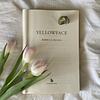Take a photo of a barcode or cover
challenging
emotional
reflective
sad
tense
fast-paced
Plot or Character Driven:
Character
Strong character development:
Complicated
Loveable characters:
Complicated
Diverse cast of characters:
Yes
Flaws of characters a main focus:
Yes
reflective
challenging
dark
mysterious
reflective
tense
medium-paced
Plot or Character Driven:
Character
Strong character development:
Yes
Loveable characters:
No
Diverse cast of characters:
No
Flaws of characters a main focus:
Yes
dark
emotional
inspiring
mysterious
reflective
relaxing
tense
medium-paced
Plot or Character Driven:
Character
Strong character development:
Yes
Loveable characters:
No
Diverse cast of characters:
No
Flaws of characters a main focus:
Yes
dark
mysterious
reflective
medium-paced
Plot or Character Driven:
Character
Strong character development:
Complicated
Loveable characters:
No
Diverse cast of characters:
N/A
Flaws of characters a main focus:
N/A
emotional
tense
fast-paced
Plot or Character Driven:
Character
Strong character development:
Complicated
Loveable characters:
No
Diverse cast of characters:
No
Flaws of characters a main focus:
Yes
"The children stared at me. I felt their gazes longing to tame me, but more brilliant was the brightness of the life outside them..."
"The Lost Daughter" is not a feel-good book. There is so much heartbreak, shame, and anger packed into so few pages. Leda, the protagonist, is profoundly unlikeable. But that doesn't mean she is unrelatable. I feel a great deal of women must see themselves in Leda's struggle to grow as an individual but feeling that she can't truly be her own person due to the pressure of motherhood. When Nina opens up to Leda, it reinforces the universality of the constant battle that mothers have - either you are a good, devoted parent but you have no true sense of self, or you achieve your dreams and potential but are viewed as a neglectful and selfish person. In a way, even Ferrante herself, by using a pseudonym and writing anonymously, is furthering the notion that all women are aware of this dichotomy and feel its effects. Ferrante could be anyone. She could be you.
It may be the translation of the work, or just the way Ferrante writes, but I found the time-jumps very jarring. It seemed like within the same paragraph, Leda's story was current, and then all of a sudden she was talking about what happened twenty years ago. Additionally, as one of two sisters myself, Leda's constant comparison and judgment of her two daughters, even as she is thousands of miles away, was so profoundly irksome. It just hit too close to home; as someone who has compared myself to my sister countless times, Leda's internal monologue said all the cruel things I've said to myself.
This is a very quick read. But it left me with a sour taste in my mouth. I liked how every new piece of information built towards the ending and I appreciated the themes, but I can't say I loved the journey. Ferrante packs a powerful punch in such a short work. But if you are considering becoming a mother, I'd steer clear of this one. It left me feeling hopeless for young families everywhere.
"The Lost Daughter" is not a feel-good book. There is so much heartbreak, shame, and anger packed into so few pages. Leda, the protagonist, is profoundly unlikeable. But that doesn't mean she is unrelatable. I feel a great deal of women must see themselves in Leda's struggle to grow as an individual but feeling that she can't truly be her own person due to the pressure of motherhood. When Nina opens up to Leda, it reinforces the universality of the constant battle that mothers have - either you are a good, devoted parent but you have no true sense of self, or you achieve your dreams and potential but are viewed as a neglectful and selfish person. In a way, even Ferrante herself, by using a pseudonym and writing anonymously, is furthering the notion that all women are aware of this dichotomy and feel its effects. Ferrante could be anyone. She could be you.
It may be the translation of the work, or just the way Ferrante writes, but I found the time-jumps very jarring. It seemed like within the same paragraph, Leda's story was current, and then all of a sudden she was talking about what happened twenty years ago. Additionally, as one of two sisters myself, Leda's constant comparison and judgment of her two daughters, even as she is thousands of miles away, was so profoundly irksome. It just hit too close to home; as someone who has compared myself to my sister countless times, Leda's internal monologue said all the cruel things I've said to myself.
This is a very quick read. But it left me with a sour taste in my mouth. I liked how every new piece of information built towards the ending and I appreciated the themes, but I can't say I loved the journey. Ferrante packs a powerful punch in such a short work. But if you are considering becoming a mother, I'd steer clear of this one. It left me feeling hopeless for young families everywhere.
emotional
reflective
slow-paced
Plot or Character Driven:
Plot
Strong character development:
No
Loveable characters:
No
Diverse cast of characters:
Yes
challenging
dark
reflective
tense
medium-paced
Plot or Character Driven:
Character
Strong character development:
Yes
Loveable characters:
No
Diverse cast of characters:
No
Flaws of characters a main focus:
Yes
Moderate: Infidelity, Misogyny, Abandonment
Minor: Emotional abuse
emotional
relaxing
medium-paced
Plot or Character Driven:
Character
Strong character development:
Yes
Loveable characters:
No
Diverse cast of characters:
No
Flaws of characters a main focus:
Yes






